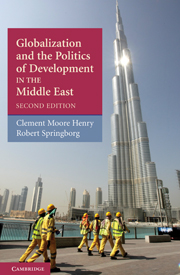Book contents
- Frontmatter
- Contents
- Figures
- Tables
- Preface to the second edition
- Preface and acknowledgments
- Glossary
- Map The Middle East and North Africa
- 1 The globalization dialectic
- 2 The challenges of globalization
- 3 Political capacities and local capital
- 4 Bunker states
- 5 Bully praetorian states
- 6 Globalizing monarchies
- 7 Precarious democracies
- 8 Conclusion
- References
- Index
7 - Precarious democracies
Published online by Cambridge University Press: 05 June 2012
- Frontmatter
- Contents
- Figures
- Tables
- Preface to the second edition
- Preface and acknowledgments
- Glossary
- Map The Middle East and North Africa
- 1 The globalization dialectic
- 2 The challenges of globalization
- 3 Political capacities and local capital
- 4 Bunker states
- 5 Bully praetorian states
- 6 Globalizing monarchies
- 7 Precarious democracies
- 8 Conclusion
- References
- Index
Summary
The MENA is the world's least democratized region, so it is not surprising that even its democracies have substantial flaws. Indeed, it is only by adopting an undemanding definition of democracy, which is change of government through free and fair elections, that one can even speak of democracies in the region. If one were to add slightly more restrictive criteria, such as provision of political rights and civil liberties to all citizens, to say nothing of yet more stringent ones such as a political culture supportive of democratic norms and processes, then the region could be deemed to be entirely without established democracies. Israel, the only country in the region that has consistently managed to change its government through free and fair elections, denies equal rights to its Arab citizens and any rights whatsoever to those living under its occupation in the West Bank and its imposed isolation of Gaza. Turkey's military removed elected governments in 1960, 1971, 1980, and 1997. Since 2002, it has intermittently sought to undermine the authority of the moderate Islamist AKP (Justice and Development Party) government elected in that year and reelected by a historic margin five years later. In Lebanon, which essentially lost its sovereignty to Syria in the late 1970s and did not regain it until 2005, sectarian divisions that have always cleaved the country have increasingly taken geographic form, so that the country has been “ethnically cleansed” into virtual self-governing cantons, which are themselves not democratic. But most deficient of all is Iran, which made it into the democratic category for our previous edition by virtue of President Muhammad Khatami's election in 1997. Alas, that election ultimately did not truly change the government, for Supreme Leader Ayatollah Ali Khamenei, backed by elements of the clerical establishment and the Islamic Revolutionary Guard Corps, first curtailed the exercise of President Khatami's power and then, in 2005 and again in 2009, ensured that their fellow hardliner, Mahmud Ahmadinejad, won the presidential election, in the later case with a preposterous margin. So Iran has slid down to the status of being a bully (Islamic) republic, thereby suggesting the fragility of MENA democracies more generally. Kuwait, the most liberal of the GCC monarchies, does hold free and fair elections, but their outcomes determine not who governs, but who sits in a parliament that has tried but thus far failed to truly circumscribe monarchial rule.
- Type
- Chapter
- Information
- Globalization and the Politics of Development in the Middle East , pp. 261 - 313Publisher: Cambridge University PressPrint publication year: 2010



